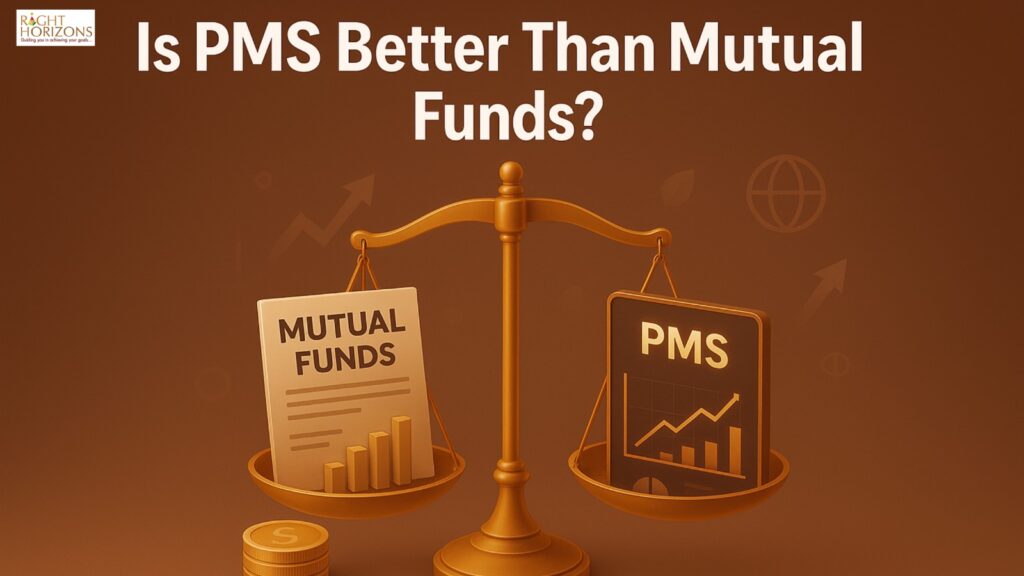Is PMS Better Than Mutual Funds?

Whether PMS is better than mutual funds depends on your investment amount, risk tolerance, and need for customization. Portfolio Management Services aren’t universally superior—they’re designed for high-net-worth individuals with different needs than typical mutual fund investors.
You might be wondering about the real differences between these investment options. Before diving deeper, consider getting a free portfolio scan to understand your current investment position. Here’s a breakdown of when each makes sense for your financial goals.
Comparing PMS and Mutual Funds: The Facts
| Feature | Mutual Funds | PMS |
|---|---|---|
| Minimum Investment | ₹100–₹500 (SIP) | ₹50 lakh |
| Customization | Standardized portfolio | Fully personalized |
| Direct Ownership | Own fund units | Own actual stocks/securities |
| Fees | 0.5–2.5% expense ratio | 1–2.5% fixed management fees; option to pay only on performance or a mix of lower fixed fee + performance fee over hurdle rate |
| Liquidity | Very high | High but may have restrictions |
| Regulation | Heavily regulated by SEBI | Less regulated |
Why Mutual Funds Work for Most Investors
When PMS Becomes the Right Choice
Complete Portfolio Customization
Unlike mutual funds where everyone gets the same portfolio, PMS lets you:- Exclude certain sectors or companies based on your values
- Focus on particular investment themes or strategies
- Adjust risk levels according to your exact preferences
Direct Ownership Benefits
With PMS, you actually own the individual stocks and securities, which means:- Direct voting rights in companies
- Corporate actions (dividends, bonuses) come directly to you
- Tax planning flexibility through strategic buying and selling
Personal Relationship with Managers
You get direct access to portfolio managers for strategic discussions and regular updates on your investments.Making Your Decision
Consider these practical factors:
Choose Mutual Funds If You:
- Have less than ₹50 lakh to invest
- Want professional management without high fees
- Prefer diversified, less volatile investments
- Value regulatory protection and transparency
- Want easy liquidity and straightforward taxation
Choose PMS If You:
- Have ₹50 lakh+ available for investment
- Want complete control over your portfolio composition
- Need customization for certain financial goals or restrictions
- Don’t mind higher fees and volatility for potential higher returns
- Want direct ownership of securities
Different investor types have different PMS options: conservative investors, risk-takers, and aggressive investors each have tailored approaches.
Can You Use Both?
Yes! Many sophisticated investors use a hybrid approach:
- Core holdings in diversified mutual funds for stability
- Satellite allocation to PMS for customization and direct ownership
This strategy gives you the best of both worlds—broad market exposure through funds and targeted strategies through PMS. Learn more about creating a balanced portfolio and wealth management strategies.
Final Considerations
For most investors, mutual funds are the better choice due to their accessibility, diversification, and cost-effectiveness. PMS only makes sense if you have substantial wealth, need significant customization, and are comfortable with higher costs and risks.
The “better” option depends entirely on your financial situation, investment goals, and how much involvement you want in managing your portfolio. Don’t let marketing claims about exclusivity or personalization sway you if a simple, diversified mutual fund portfolio better serves your needs.
Ready to explore your options? Consider our PMS strategies, learn about our investment approach, or get started with a free portfolio analysis to make an informed decision.

 Talk to us
Talk to us